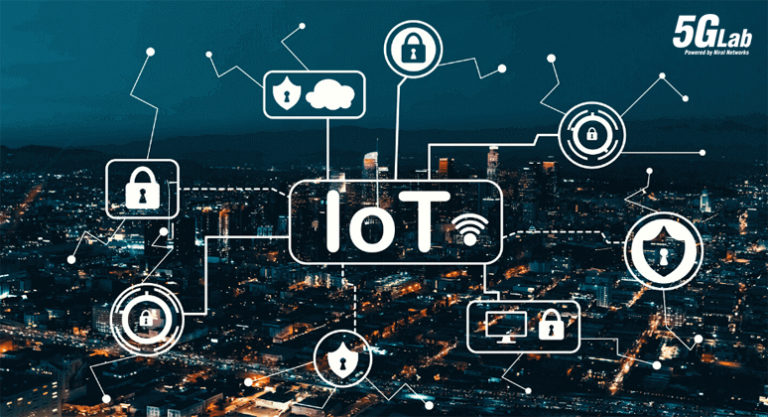IoT Integration with Private 5G Network:
A Catalyst for Smart Cities and Industries in India

The Internet of Things (IoT) is ushering in a new era, reshaping the way we live and work by connecting billions of devices to the internet, generating valuable data. This data, when harnessed effectively, has the potential to optimize efficiency, productivity, and decision-making across a multitude of industries.
Private 5G networks have emerged as a critical enabler of IoT. With its advantages in speed, latency, and reliability, 5G is an ideal choice for supporting real-time data processing and communication in IoT applications.
Benefits of IoT Integration with Private 5G Networks for Enterprises
Enterprises integrating IoT with private 5G networks stand to gain several advantages:
- Enhanced Security: Private 5G networks are isolated from public networks, providing a higher level of security, crucial for protecting sensitive data.
- Improved Reliability: Private 5G networks are less susceptible to interference and congestion, ensuring reliable communication for IoT devices, even in challenging environments.
- Greater Control: Enterprises retain full control over their private 5G networks, allowing customization to meet their specific needs and requirements.
5GLab: Pioneering IoT Connectivity and Communication
5GLab, led by the University of Surrey in collaboration with industry and academia partners, is a research initiative that explores how 5G can facilitate seamless connectivity and communication for a vast number of IoT devices. It leverages various technologies to test and demonstrate 5G’s capabilities for IoT applications, while also developing tools and techniques to assist enterprises in deploying and managing private 5G networks.
How 5G Transforms Smart Cities and Smart Industries in India
In India, 5G has the potential to revolutionize the landscape, paving the way for smart cities and industries by providing the connectivity and bandwidth required for diverse IoT applications:
- Smart Cities: 5G can enhance traffic management, reduce energy consumption, and boost public safety. For instance, 5G-connected traffic lights optimize traffic flow, while smart meters help consumers save energy and money. Surveillance cameras connected through 5G deter crime and enhance public safety.
- Smart Industries: Manufacturing, healthcare, and agriculture are among the sectors that benefit from 5G. For example, 5G-connected robots automate manufacturing tasks, enhance product quality, and reduce costs. Medical devices connected via 5G provide real-time data to healthcare professionals, helping them make informed decisions. 5G-connected sensors monitor crop conditions and automate irrigation systems.
Key Developments in India
Enterprises and the Indian government are actively investing in private 5G networks for IoT. For instance:
- Reliance Jio: Reliance Jio has expressed plans to set up private 5G networks in India to support IoT applications in various sectors, including agriculture, healthcare, and education.
- Bharat Electronics Limited (BEL): BEL has signed agreements to collaborate on the development and deployment of private 5G networks for industrial IoT applications in India.
Facts and Figures
Recent reports highlight the significant impact of IoT and 5G:
- A report by Ericsson anticipates the number of IoT devices connected to cellular networks will grow from 1.3 billion in 2021 to 4.4 billion in 2027.
- Gartner‘s report forecasts the global market for private 5G networks will grow from $1.8 billion in 2021 to $26.7 billion in 2026.
- ABI Research estimates that 5G-enabled IoT applications will generate $1.1 trillion in economic value globally by 2030.
IoT Integration with Private 5G Networks in India
India is one of the leading countries in the world in terms of IoT adoption. The Indian government is also investing heavily in 5G technology. This is creating a strong foundation for the development of private 5G networks for IoT in India.
A number of Indian enterprises are already deploying private 5G networks for IoT. For example, Reliance Jio is working with a number of enterprises to deploy private 5G networks in manufacturing, healthcare, and transportation. Bharti Airtel is also working with a number of enterprises to deploy private 5G networks.
Research Areas of Development
There are a number of research areas that are focused on developing new technologies and applications for IoT integration with private 5G networks. These research areas include:
- Network slicing: Network slicing allows operators to create multiple virtual networks on a single physical network. This can be used to create dedicated networks for IoT applications, with specific performance and security requirements.
- Edge computing: Edge computing brings computing and storage resources closer to the devices where data is generated. This can reduce latency and improve performance for IoT applications.
- Artificial intelligence (AI): AI can be used to analyse IoT data in real time and make intelligent decisions. This can be used to improve the efficiency and productivity of IoT applications.
Niral Networks plays a pivotal role in advancing the establishment of 5G Labs in India. As a dynamic and innovative technology company, Niral Networks actively collaborates with academic institutions, industry partners, and government initiatives to drive research, development, and implementation of 5G technologies. This proactive engagement serves to catalyse the growth of 5G Labs in India, fostering an environment where cutting-edge research, testing, and innovation can thrive, ultimately propelling India to the forefront of 5G technology adoption and deployment. With a commitment to advancing the technology landscape, Niral Networks encourages IoT organizations to join the thriving community of the 5G Lab. This initiative not only paves the way for groundbreaking research but also creates a dynamic ecosystem where industry leaders, experts, and innovators come together to shape the future of IoT in India.
